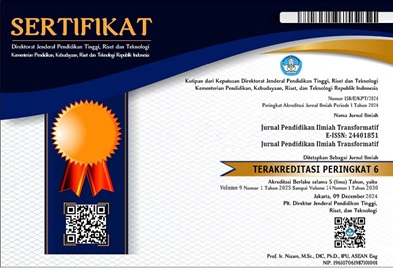PENINGKATAN BERPIKIR KRITIS PESERTA DIDIK DENGAN PENERAPAN MODEL PBL BERBASIS ESD PADA MATERI PERUBAHAN IKLIM
Kata Kunci:
Keterampilan berpikir kritis, ESD, PBL, Perubahan iklim, Critical thinking skills, Climate ChangeAbstrak
Penelitian ini bertujuan untuk meningkatkan keterampilan berpikir kritis peserta didik dengan menerapkan model Problem Based Learning (PBL) berbasis Educational For Sustainable Development (ESD). Dengan hasil penelitian meliputi keterlaksanaan pembelajaran, peningkatan keterampilan berpikir kritis, dan respon peserta didik. Jenis penelitian yang digunakan adalah metode quasi experimental design, dengan bentuk desain penelitian yang digunakan adalah nonequivalent control group design. Subjek penelitian ini meliputi peserta didik MBI Amanatul Ummah Pacet, dengan dua kelas yaitu (X-6 dan X-8), dimana X-6 sebagai kelas kontrol sebanyak 30 peserta didik serta X-8 sebagai kelas eksperimen sebanyak 32 peserta didik yang dipilih dengan menggunakan teknik sampling jenuh. Data diperoleh melalui angket dan tes. Dengan waktu penelitian terdapat tiga kali pertemuan yang memuat lima fase sesuai sintaks PBL berbasis ESD Perolehan hasil nilai pre-test dan post-test pada kelas eksperimen yang diterapkan model PBL berbasis ESD dengan hasil post-test lebih tinggi dari pada hasil pre-test dengan didukung skor N-gain sebesar 0,84 kategori “tinggi” dan kelas kontrol memperoleh skor N-gain 0,50 dengan kategori “sedang”, serta diperkuat dengan perhitungan Cohen’s effect size pada kelas eksperimen dengan perolehan senilai 0,816 yang menunjukkan pengaruh besar atas pembelajaran dengan model PBL berbasis ESD. Uji hipotesis dengan Independent Sample t-test diperoleh Sig. value sebesar 0,08 > 0,05. Hasil data angket respon peserta didik pada kelas eksperimen diperoleh rata-rata persentase 86,82% dengan kategori “sangat baik”. Berdasarkan hasil demikian, diperoleh kesimpulan bahwa terdapat peningkatan atau pengaruh signifikan penggunaan model PBL berbasis ESD terhadap keterampilan berpikir kritis pada materi perubahan iklim.
This research aims to improve students' critical thinking skills by applying the Problem Based Learning (PBL) model based on Education For Sustainable Development (ESD). The research results include the implementation of learning, increasing critical thinking skills, and student responses. The type of research used is the quasi experimental design method, with the research design used being nonequivalent control group design. The subjects of this research included MBI Amanatul Ummah Pacet students, with two classes, namely (X-6 and using saturated sampling technique. Data was obtained through questionnaires and tests. During the research period, there were three meetings containing five phases according to the ESD-based PBL syntax. Obtaining pre-test and post-test scores in the experimental class where the ESD-based PBL model was applied with post-test results being higher than the pre-test results was supported by The N-gain score was 0.84 in the "high" category and the control class obtained an N-gain score of 0.50 in the "medium" category, and this was strengthened by the calculation of Cohen's effect size in the experimental class with a gain of 0.816 which shows a large influence on learning with ESD-based PBL model. Hypothesis testing with the Independent Sample t-test obtained Sig. value of 0.08 > 0.05. The results of the student response questionnaire data in the experimental class obtained an average percentage of 86.82% in the "very good" category. Based on these results, it was concluded that there was an increase or significant influence of the use of the ESD-based PBL model on critical thinking skills in climate change material.





